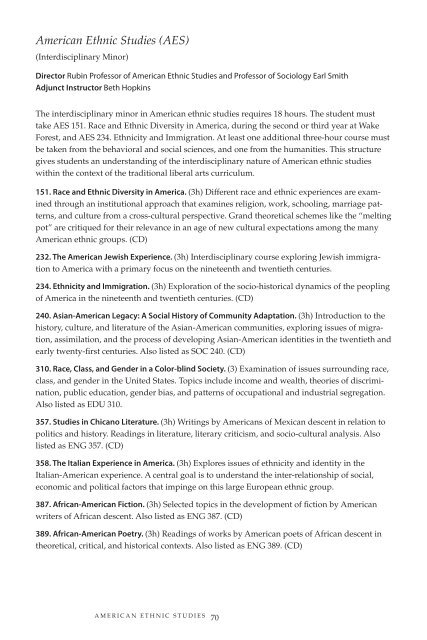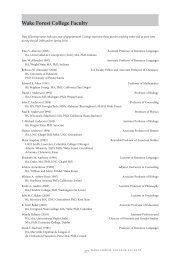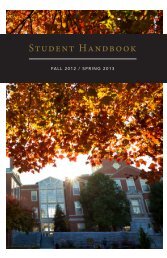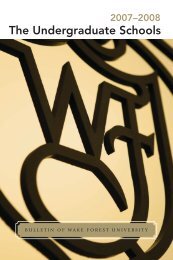theundergraduateschoo ls - Wake Forest University
theundergraduateschoo ls - Wake Forest University
theundergraduateschoo ls - Wake Forest University
You also want an ePaper? Increase the reach of your titles
YUMPU automatically turns print PDFs into web optimized ePapers that Google loves.
American Ethnic Studies (AES)<br />
(Interdisciplinary Minor)<br />
Director Rubin Professor of American Ethnic Studies and Professor of Sociology Earl Smith<br />
Adjunct Instructor Beth Hopkins<br />
The interdisciplinary minor in American ethnic studies requires 18 hours. The student must<br />
take AES 151. Race and Ethnic Diversity in America, during the second or third year at <strong>Wake</strong><br />
<strong>Forest</strong>, and AES 234. Ethnicity and Immigration. At least one additional three-hour course must<br />
be taken from the behavioral and social sciences, and one from the humanities. This structure<br />
gives students an understanding of the interdisciplinary nature of American ethnic studies<br />
within the context of the traditional liberal arts curriculum.<br />
151. Race and Ethnic Diversity in America. (3h) Different race and ethnic experiences are examined<br />
through an institutional approach that examines religion, work, schooling, marriage patterns,<br />
and culture from a cross-cultural perspective. Grand theoretical schemes like the “melting<br />
pot” are critiqued for their relevance in an age of new cultural expectations among the many<br />
American ethnic groups. (CD)<br />
232. The American Jewish Experience. (3h) Interdisciplinary course exploring Jewish immigration<br />
to America with a primary focus on the nineteenth and twentieth centuries.<br />
234. Ethnicity and Immigration. (3h) Exploration of the socio-historical dynamics of the peopling<br />
of America in the nineteenth and twentieth centuries. (CD)<br />
240. Asian-American Legacy: A Social History of Community Adaptation. (3h) Introduction to the<br />
history, culture, and literature of the Asian-American communities, exploring issues of migration,<br />
assimilation, and the process of developing Asian-American identities in the twentieth and<br />
early twenty-first centuries. A<strong>ls</strong>o listed as SOC 240. (CD)<br />
310. Race, Class, and Gender in a Color-blind Society. (3) Examination of issues surrounding race,<br />
class, and gender in the United States. Topics include income and wealth, theories of discrimination,<br />
public education, gender bias, and patterns of occupational and industrial segregation.<br />
A<strong>ls</strong>o listed as EDU 310.<br />
357. Studies in Chicano Literature. (3h) Writings by Americans of Mexican descent in relation to<br />
politics and history. Readings in literature, literary criticism, and socio-cultural analysis. A<strong>ls</strong>o<br />
listed as ENG 357. (CD)<br />
358. The Italian Experience in America. (3h) Explores issues of ethnicity and identity in the<br />
Italian-American experience. A central goal is to understand the inter-relationship of social,<br />
economic and political factors that impinge on this large European ethnic group.<br />
387. African-American Fiction. (3h) Selected topics in the development of fiction by American<br />
writers of African descent. A<strong>ls</strong>o listed as ENG 387. (CD)<br />
389. African-American Poetry. (3h) Readings of works by American poets of African descent in<br />
theoretical, critical, and historical contexts. A<strong>ls</strong>o listed as ENG 389. (CD)<br />
A M E R I C A N E T H N I C S T U D I E S 70






